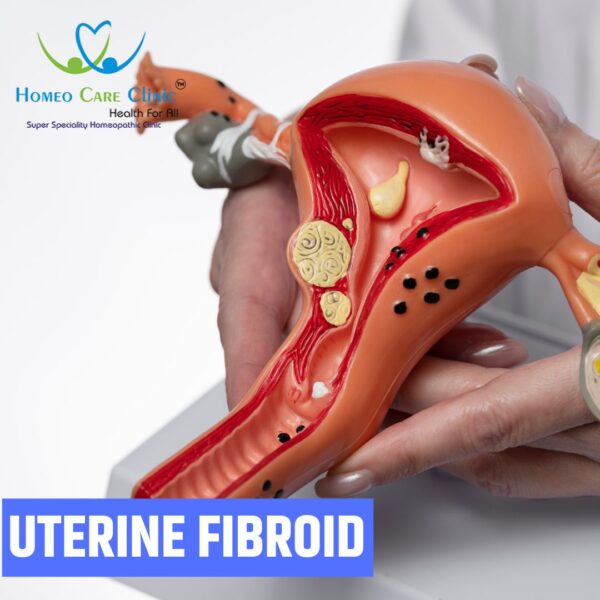Uterine fibroid are noncancerous developments of the uterus that frequently look during childbearing years. Also known as leiomyomas or myomas, uterine fibroids are made up of muscle and connective tissue that can develop in various parts of the uterine wall. This is vary in size and number and may be asymptomatic or cause a variety of symptoms. The exact cause of uterine fibroids is not fully understood, but several factors are believed to contribute to their development. I will provide you with an overview of uterine fibroids, including their definition, potential causes, types, and some homeopathic remedies.
Definition
Uterine fibroids are (noncancerous) growth or tumours that create in the smooth muscle layer (myometrium) of the uterus. They can vary in size and location within the uterus.
Causes
The exact cause of uterine fibroids is not known, but several factors are thought to contribute:
- Hormonal factors: Estrogen and progesterone, two hormones that stimulate the development of the uterine lining during each menstrual cycle, may promote the growth of fibroids.
- Genetic factors: A family history of uterine fibroids can increase your risk of evolving them.
- Race and ethnicity: African-American women are more probable to develop fibroids, and they often develop them at a younger age and with more severe symptoms.
- Age and hormonal changes: Uterine fibroids tend to shrink after menopause when hormone levels decrease.
Diet For Uterine Fibroids Click here
Types of Uterine Fibroids
There are several types of uterine fibroids based on their location in or on the uterus:
- Intramural fibroids: These are the most communal and grow within the muscular wall of the uterus.
- Submucosal fibroids: These grow just under the innermost lining of the uterus and may cause heavy menstrual bleeding and fertility issues.
- Subserosal fibroids: These develop on the outer wall of the uterus and can press against nearby organs, causing pressure or pain.
- Pedunculated fibroids: These are attached to a stalk or peduncle and can grow inside or outside the uterus.
Homeopathic Medicine for Fibroids in uterus
Click here to order your Medicine
Homeopathy is a holistic system of medicine that uses highly diluted substances to stimulate the body’s natural healing processes. It is important to note that homeopathic remedies are individualized based on a person’s specific symptoms, constitution, and overall health. Consulting a qualified homeopathic practitioner is recommended for the best results. Here are five common fibroid medicine in homeopathy that may be considered. homeo medicine for fibroids
- Thuja Occidentalis: Used for fibroids with a history of vaccination or when there is a tendency to develop abnormal growths.
- Lachesis: Indicated for left-sided fibroids, especially if there is a sensation of constriction, heat, and sensitivity to touch.
- Fraxinus Americana: Used for uterine fibroids with a bearing-down sensation and a feeling of fullness in the pelvis.
- Sepia: May be considered for uterine fibroids associated with heavy, painful periods and a sense of indifference or irritability.
- Calcarea Carbonica: Appropriate for women with fibroids who are overweight and chilly, with heavy and painful periods. Click here to order your Medicine
Homeopathic Treatment for Uterine Fibroids
FAQs:
Q 1- Is Homeopathy useful for fibroid?
Yes, Homeopathy can cure fibroid. Homeopathy medicine can help to resolve symptoms and also helps to dissolve fibroid completely. The recovery time depends upon the size and intensity of the symptoms. Earlier have discussed the medicine that is greatly effective in treatment.
Q 2 - Are uterine fibroids cancerous growths?
No, the Uterine fibroid is non-cancerous (Benign) in growth.
Q3 – I have heavy menses from many months; can it be due to uterine fibroid?
Heavy bleeding is one of the key symptoms of uterine fibroid, but you need to correlate it with other symptoms also. For further diagnosis you need investigations
Q4 – Can uterine fibroid impact pregnancy?
Pregnancy can be impacted because of uterine fibroid, but not in all cases. In some cases, it has been found a pregnant woman having uterine fibroid as well. There are chances of miscarriage also.
Q5 – Can uterine fibroid regrow even after surgery?
Yes, there are chances that fibroid can regrow after surgery because in surgery they remove the fibroid part but don’t cure the root cause of fibroid.
Q6 – What is the maximum size of uterine fibroid, you have treated?
We have treated larger sizes of uterine fibroid sizes extending to 3×3 cm as per our clinical guidelines and not as per standard medical books. Larger sizes take longer time, however, time duration also varies.







